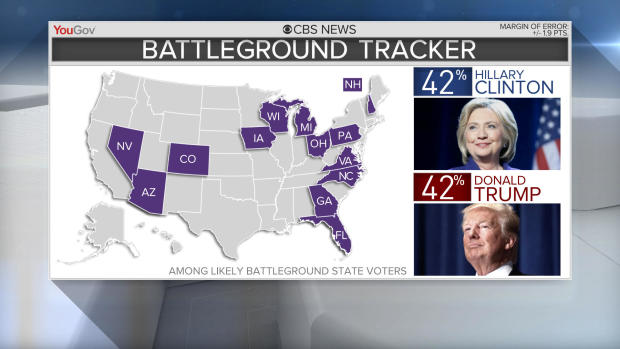Poll: Donald Trump, Hillary Clinton tied across battleground states
The race across the combined battlegrounds is as tight as can be, tied 42 percent to 42 percent.
Clinton was up one point last week, and was up two points back on Labor Day weekend. Voters in these states are still looking for change, while the partisan divide remains particularly deep.
Fifty-five percent of battleground voters want to see “big changes” in the nation’s politics and economy in the next few years. Forty-three percent want “some changes” and only 2 percent think things are fine and not in need of much change. Trump leads by a wide margin on being trusted to change Washington: Forty-seven percent trust Trump to do it, 20 percent trust that Clinton can do it. Nine percent of independents trust Clinton can change Washington. Only 47 percent of Democrats trust Clinton to change Washington. A similar 41 percent of Democrats trust neither candidate to do it.
And to Donald Trump’s voters, Trump represents that larger chance for change. By a roughly five to one margin, Trump’s voters say their support is more about “a chance to change politics as usual” (49 percent) than it is just about Trump himself, as a person, just 9 percent. And 42 percent say it is both, so the “change” component is present for almost all of Trump’s voters, in some part.
Clinton does lead 47 percent to 39 percent on being trusted to handle the job well day-to-day, and by 43 percent to 34 percent on being trusted to act in a way that America can be proud of. Twenty-three percent think neither would.
One reason this race remains tight and most have made up their minds: partisans have very negative outlooks on what might happen if the other side wins. Eighty-six percent of Democrats say the country might be “damaged beyond repair” if Trump wins, and 83 percent of Republicans think the country might be “damaged beyond repair” if Clinton wins.
Underlying part of the call for change are the pervasive, negative views of the economy. While reports this week suggest the economy – by many traditional measures – was doing better, many voters don’t say it is. Fifty-five percent say it’s in bad shape. The reason, on the whole, is that many voters don’t feel the gains are going to them, specifically, nor that opportunity is available for all.
Sixty percent outright call the economy unfairly “rigged” in that only “certain people” get advantages that others don’t. Only one third think it works fairly to reward hard work. In response to reports that things are better, 42 percent say “maybe for some people, but not for people like me.” And as many previous studies have shown, these kinds of evaluations aren’t always economic, they’re often political -- based on who controls the White House, in that Democrats are more likely to say things are good, while Republicans say they’re bad. So the president gets the largest share of blame for the economy among those who say things are bad (67 percent say he himself is a big reason the economy is bad) and he also gets the most credit for the economy (48 percent, the top answer on the list) among those who think things are good. This is over other factors such as availability of jobs, globalization, and technological changes. Asked who they think has gained since the last recession, voters say banks (64 percent say so) and large businesses. Who has lost? Blue-collar workers, and – a majority 52 percent - say “people like me.”
With regard to the discussion of Hillary Clinton’s pneumonia last week a majority calls it a matter of disclosure more so than health (51 percent) while also feeling that it did raise larger issues about Clinton’s health – Republicans in particular say this - but voters overall feel nonetheless it was still blown out of proportion.
Following the controversy over Hillary Clinton’s comment about Donald Trump’s supporters (which Democrats say was “telling it like it is” but which Republicans and independents saw as an insult), the survey looked at how each candidate’s voters feel about the other side. We asked Clinton voters why they think Trump’s voters are with Trump, and vice versa. Sixty-eight percent of Clinton’s voters think Trump’s voters are racially insensitive. Seventy-six percent of Clinton’s voters feel others are voting for Trump because Trump is “fooling them.” Seventy-three percent of Trump voters feel Clinton’s voters are “looking for special privileges.” And 83 percent of Trump’s voters say Clinton is fooling her voters. Taken together, the views voters hold of those who disagree with them politically provide yet another sign of the continuing political divide.
This CBS News 2016 Battleground Tracker is a panel study based on 4202 interviews conducted on the internet of registered voters in North Carolina and Pennsylvania, Arizona, Colorado, Florida, Georgia, Iowa, Michigan, New Hampshire, Nevada, Ohio, Virginia, and Wisconsin. The margin of error is 1.9%.

